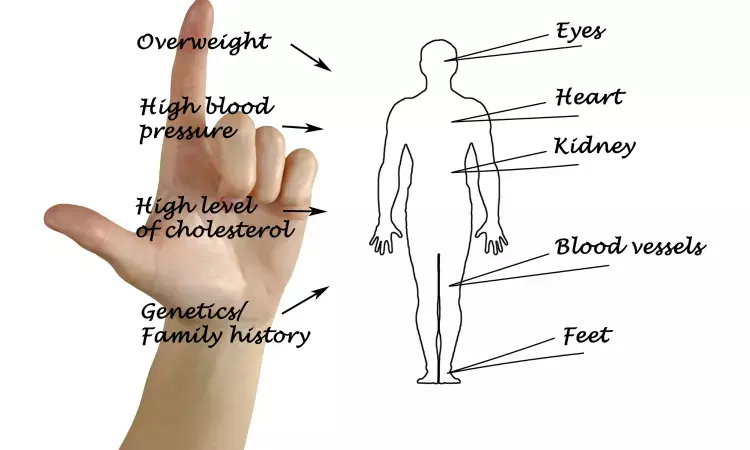- Home
- Medical news & Guidelines
- Anesthesiology
- Cardiology and CTVS
- Critical Care
- Dentistry
- Dermatology
- Diabetes and Endocrinology
- ENT
- Gastroenterology
- Medicine
- Nephrology
- Neurology
- Obstretics-Gynaecology
- Oncology
- Ophthalmology
- Orthopaedics
- Pediatrics-Neonatology
- Psychiatry
- Pulmonology
- Radiology
- Surgery
- Urology
- Laboratory Medicine
- Diet
- Nursing
- Paramedical
- Physiotherapy
- Health news
- Fact Check
- Bone Health Fact Check
- Brain Health Fact Check
- Cancer Related Fact Check
- Child Care Fact Check
- Dental and oral health fact check
- Diabetes and metabolic health fact check
- Diet and Nutrition Fact Check
- Eye and ENT Care Fact Check
- Fitness fact check
- Gut health fact check
- Heart health fact check
- Kidney health fact check
- Medical education fact check
- Men's health fact check
- Respiratory fact check
- Skin and hair care fact check
- Vaccine and Immunization fact check
- Women's health fact check
- AYUSH
- State News
- Andaman and Nicobar Islands
- Andhra Pradesh
- Arunachal Pradesh
- Assam
- Bihar
- Chandigarh
- Chattisgarh
- Dadra and Nagar Haveli
- Daman and Diu
- Delhi
- Goa
- Gujarat
- Haryana
- Himachal Pradesh
- Jammu & Kashmir
- Jharkhand
- Karnataka
- Kerala
- Ladakh
- Lakshadweep
- Madhya Pradesh
- Maharashtra
- Manipur
- Meghalaya
- Mizoram
- Nagaland
- Odisha
- Puducherry
- Punjab
- Rajasthan
- Sikkim
- Tamil Nadu
- Telangana
- Tripura
- Uttar Pradesh
- Uttrakhand
- West Bengal
- Medical Education
- Industry
Early initiation of SGLT2 inhibitors reduces MACE in Type 2 Diabetes patients at ASCVD risk

China: An investigation has revealed that initiation of SGLT2 inhibitor early in Type 2 Diabetes (T2D) patients reduces the rates of major adverse cardiovascular events (MACE) with known or at risk of ASCVD (atherosclerotic cardiovascular disease).
The findings of the study are published in PLOS ONE.
It is already known that T2D patients are at higher risk of adverse cardiovascular events.
Empagliflozin has reportedly reduced 3-point major adverse cardiovascular events (MACE) risk, namely, non-fatal stroke, non-fatal MI and cardiovascular death, than placebo, as per EMPA-REG OUTCOME trial.
Dapagliflozin failed to demonstrate lower MACE rates as per DECLARE-TIMI 58 trial.
There is a lack of data and unclarity between the benefit received from SGLT2i in such cases pertaining to optimal timing of initiation.
Considering this, a study was conducted by Dr Wen Sun from the Department of Medicine and Therapeutics at Prince of Wales Hospital from The Chinese University of Hong Kong, China, to determine whether early initiation of SGLT2i improves CV outcomes or not in T2D patients.
The summary points of the study are:
· During the study period, the earliest date of prescription was the drug initiation date.
· Dx-to-Rx time ≤12 months or >12 months were the two levels of exposure the whole cohort was divided into.
· Binary logistic regression determined the predictors of early initiation of SGLT2i.
· A composite of 3-point MACE was the primary outcome measured.
· The duration of median follow-up was 2.8 years.
· Among 29,309 T2D of mean age of 57.6 years, 59.0% of patients were men.
· 23.6% of T2D patients had a history of established ASCVD.
· 66.6% of T2D patients had a history of additional CV risk factors.
· 19.0% had Dx-to-Rx time ≤12 months and was associated with lower MACE rates. The hazard ratio was 0.27, and 95% Confidence Interval.
· There were beneficial results reported for initiating SGLT2i early in patients with additional CV risk factors or known ASCVD. These were not reported in patients without CV risk factors or ASCVD. The P for interaction was calculated as 0.001.
The researchers said, "Our study results support guidelines recommending SGLT2i for diabetic patients with established ASCVD or at high risk of ASCVD." They wrote, "We demonstrated that initiating SGLT2i early within 12 months after T2D diagnosis with known or at high risk of ASCVD leads to better CV outcomes than delayed initiation."
Our study showed the benefit might be expanded to those patients with a history of ASCVD with/without prior MI and/or risk factors. They added.
Further reading:
Sun W, Kong APS, Yan BP. Impact of early initiation of sodium-glucose cotransporter two inhibitors on cardiovascular outcomes in people with diabetes and known or at risk of atherosclerotic cardiovascular disease: Propensity score-matched analysis. PLoS One. 2022 Nov 4;17(11):e0277321. DOI: 10.1371/journal.pone.0277321. PMID: 36331955; PMCID: PMC9635734.
BDS, MDS in Periodontics and Implantology
Dr. Aditi Yadav is a BDS, MDS in Periodontics and Implantology. She has a clinical experience of 5 years as a laser dental surgeon. She also has a Diploma in clinical research and pharmacovigilance and is a Certified data scientist. She is currently working as a content developer in e-health services. Dr. Yadav has a keen interest in Medical Journalism and is actively involved in Medical Research writing.
Dr Kamal Kant Kohli-MBBS, DTCD- a chest specialist with more than 30 years of practice and a flair for writing clinical articles, Dr Kamal Kant Kohli joined Medical Dialogues as a Chief Editor of Medical News. Besides writing articles, as an editor, he proofreads and verifies all the medical content published on Medical Dialogues including those coming from journals, studies,medical conferences,guidelines etc. Email: drkohli@medicaldialogues.in. Contact no. 011-43720751


